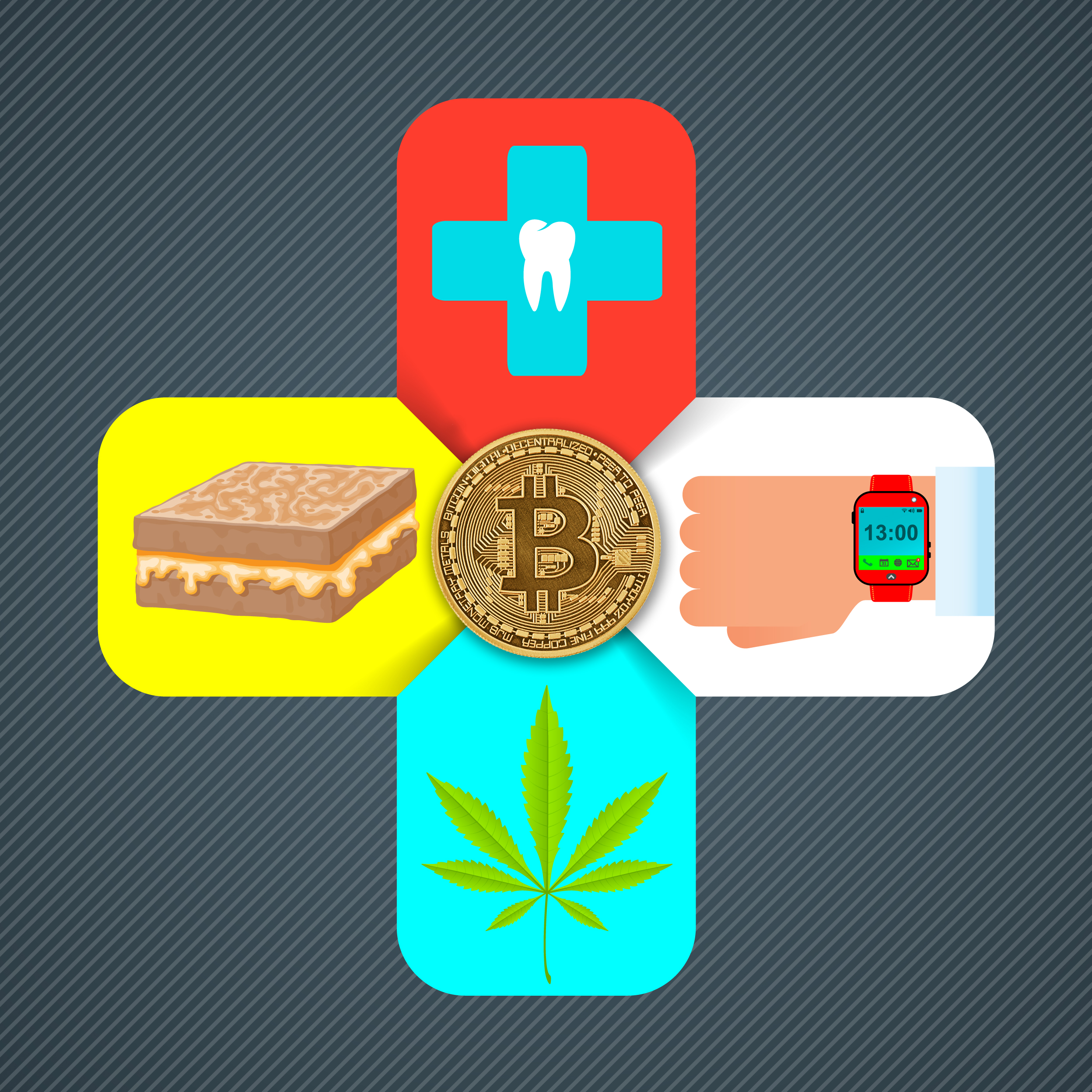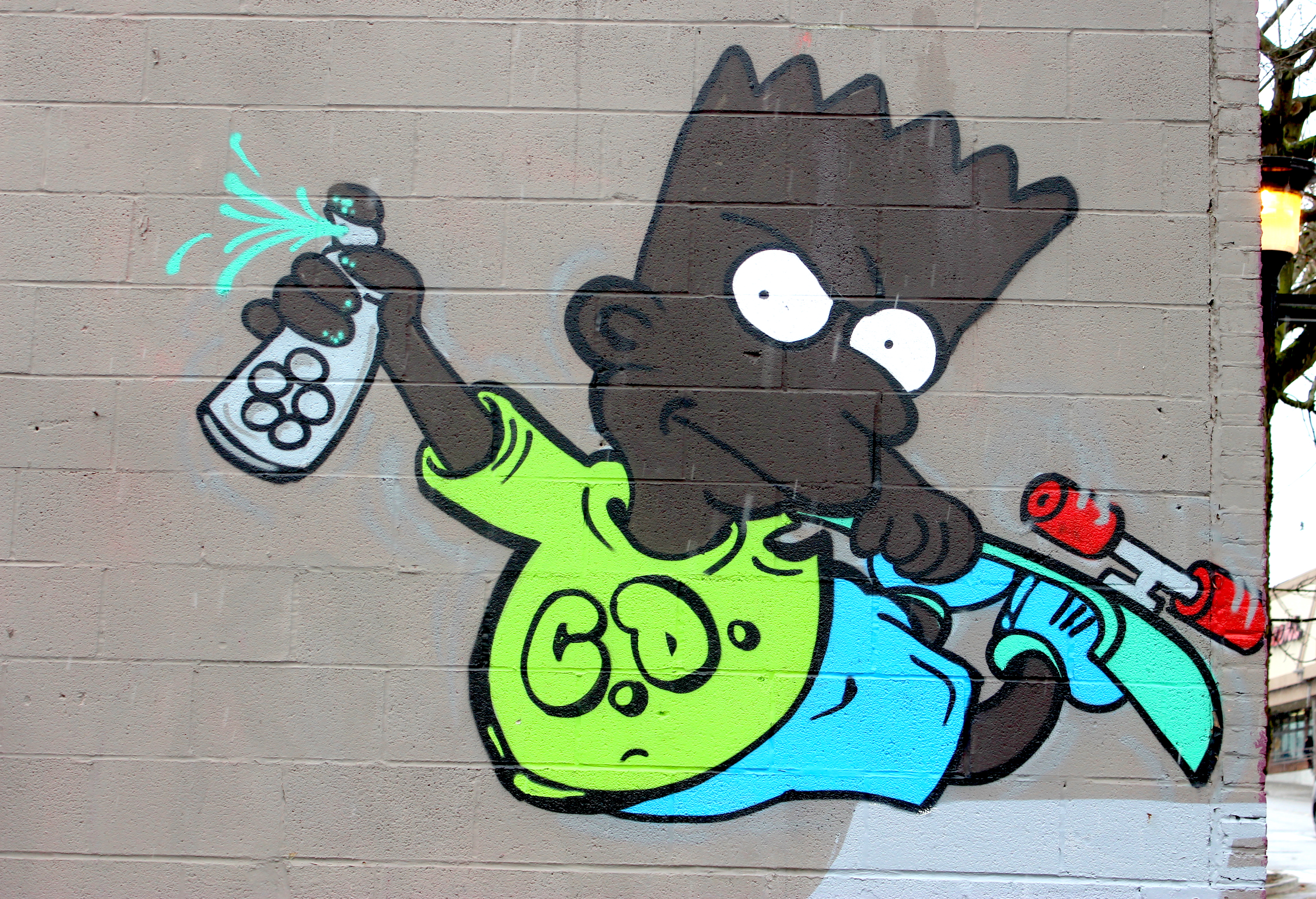Like many entrepreneurs, “J” is very interested in the way transactions work. A while back he developed a thing for bartering.
“One time I traded some firewood I got for free on Craigslist for a Coke machine. Then I traded that Coke machine for an AK-47,” says J from beneath a tie-dyed beanie. We are sitting in his car, which is filled with boxes and baggies of marijuana, parked on the abandoned rooftop of a downtown parking garage. His wife is in the driver’s seat, silently licking a Dum Dum lollipop.
“Then,” J continues, “I traded that AK-47 for a processor with an ASIC chip, optimized for Bitcoin mining. I’ve got three processors running now—I’ll wake up some mornings and find out they’ve generated $40 worth of Bitcoin.” J, you see, is on the forefront of the forefront. He runs a business that will deliver legal weed right to your door, and he accepts Bitcoin, a digital cryptocurrency, as payment. All you have to do is shoot him a text. He asks that I call him “J” because of the legal gray area he operates in—although he says he sells only to people with medical cards, Washington law is still a bit shaky on the whole weed-home-delivery game.
“I’ll chase a buck anywhere,” he says. Although he’s based in Issaquah, J will drive wherever, often working straight from 9 a.m. to 3 a.m. the next day making deliveries all over western Washington. “If it’s $5, we’ll chase it down.” Now that J has started accepting Bitcoin, he says he’s processed three transactions that way, mostly with fellow Bitcoin miners. Even people who don’t pay in Bitcoin often mention that they reached out to him because they heard he accepts it.
J isn’t alone—in addition to online retailer Overstock.com, which announced it would start accepting Bitcoin on January 9, many in the area have jumped aboard. The biggest break for Bitcoin’s legitimacy would be acceptance by local online-retail giant Amazon. Rumors that Amazon and Google are considering accepting Bitcoin have been flying around unconfirmed all month, while eBay is openly looking at the alternative currency, and is supposed to make a final decision about Bitcoin next month.
Yet the question remains: What the hell is Bitcoin?
Above: A helpful crash course on Bitcoin from advocacy site We Use Coins
In essence,
Bitcoin is a digital, alternative currency system that is managed in a peer-to-peer network, essentially a collection of civilian computers. Started in 2008, when a mysterious, yet-unidentified man created the software under the name “Satoshi Nakamoto” and released a paper outlining how it works, Bitcoin has exploded from its initial value of a penny each to around $850 a Bitcoin now. At one point last November, it reached a value of $1,242, almost the price of an ounce of gold.
Bitcoin derives its value the same way any currency does—simple supply and demand. Bitcoins are created by “miners,” people who download free Bitcoin mining software and agree to donate their processing power to maintaining the Bitcoin marketplace, solving and creating encrypted “blocks” that record and verify all the Bitcoin transactions ever processed. By creating sufficiently encrypted blocks, groups of competing miners not only oversee, support, and secure the network, they are also rewarded for each successful solution with 25 Bitcoins—right now worth $20,494.64, although that number fluctuates wildly with the market.
“J,” like many other Bitcoin miners, is a part of a mining pool, a group of people who chain their processors together to more quickly solve the encryptions, splitting their earnings according to whose processing rig provided the most heft in the process.
The result is a completely digital currency system that cuts out the middleman. Dealing in Bitcoin means dealing without banks—no 3 to 5 percent transaction fees, no foreign-exchange fees, no frozen accounts. Money goes directly from one person to another, and is secured by a network of volunteer miners.
“Although they are volatile in this early stage, Bitcoin cuts out what is frankly a very expensive and antiquated financial system,” says Garrick Hileman, a University of Washington graduate who now works as an economic historian at the London School of Economics and founded MacroDigest.com. Hileman attended the first Bitcoin convention in 2013 in San Jose, Calif., and said the level of excitement was similar to that of the dot-com boom he witnessed in the ’90s.
“In some ways you can see Bitcoin as the latest attempt to reform the global financial system,” Hileman says. “We tried to regulate the banks through Dodd-Frank, we saw a protest movement in Occupy Wall Street try to change the politics and culture of the system, and now Bitcoin is sort of phase three—Silicon Valley’s turn to take a crack at reforming Wall Street at a much more fundamental and structural way.”
Last November, the feds signaled that Bitcoin, while still not officially recognized as currency, had hit a threshold. In a Senate hearing, U.S. officials testified that Bitcoin is protected under current regulations. Federal Reserve chair Ben Bernanke wrapped up the hearing by sending the Senate a letter saying that Bitcoin “may hold long-term promise, particularly if the innovations promote a faster, more secure, and more efficient payment system.”
China, Taiwan, and Thailand have all issued prohibitions on Bitcoin, however, and India resumed Bitcoin operations just weeks ago after a December government crackdown.
But for many Seattle retailers, Bitcoin isn’t a grand political statement or a Gold Rush style investment opportunity. It’s simply another way to accept payment for services.
The Saxbe brothers run
a fantasy-themed food truck called Cheese Wizards. Bo and Tom wear pointy wizard hats and serve sandwiches with names like “The Gobblin’ King” and “Voldemortadella.” Recently a frequent customer named John Stahl, who happens to work as a communications assistant at the Bitcoin Foundation, an advocacy group based in Washington, D.C., convinced the brothers to take Bitcoin.
“We already had our iPad set up for Square and LevelUp, so we figured why not?” Bo says, referencing two other popular mobile payment apps that use traditional currency. He downloaded BitPay—an app that generates a QR code and allows customers to pay in Bitcoin from their phone—and started advertising the truck’s new feature.
“We’ll take five to six Bitcoin transactions a day,” Bo says. “A lot of techies and Amazon employees come to our truck just because they love paying in Bitcoin. We’ve never had any problems with it—we just convert them all back into U.S. dollars at the end of the day.” BitPay has a built-in function that converts Bitcoins to U.S. dollars, guaranteeing the merchant will receive the existing exchange rate at the time of the transaction.
Because a grilled cheese sandwich costs a fraction of a fraction of a Bitcoin, some customers have willingly tipped upward of $40 to $50.
“The tip seems smaller psychologically when it’s in Bitcoin,” Bo says. “We’ve tried to tell them, ‘Whoa, you know how big a tip that is, right? You really don’t have to give us that much.’ But they insist.”
While it might make sense that oddballs like Cheese Wizards and J, the weed-delivery guy, are accepting Bitcoin, some upscale merchants have joined in as well. A trip to bitcoindentist.com reveals an office in Anacortes that accepts the digital currency. Nesbit’s Fine Watch Service, a repair shop in downtown Seattle since 1895, has also started accepting Bitcoin.
“Our son is very much into Bitcoin and got us on board,” company VP Jan Nesbit tells me. “We investigated a bit and it seemed pretty easy, so we figured why not? A lot of our customers are tech guys. We put it out on Reddit that we accept Bitcoin, and we actually just got a walk-in customer who came because they found out we accept it.”
While for now a Seattleite with an interest in Bitcoin can purchase only marijuana, grilled cheese, watch repair, or dental service an hour and a half up north, many of these retailers said the same thing—they wouldn’t be surprised at all if tech-forward Seattle became a Bitcoin hub.
ksears@seattleweekly.com








